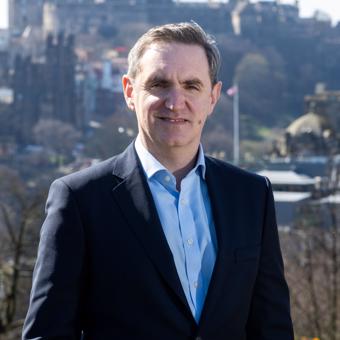Paul Maddock from DWF on diversity, inclusion & being named in The Telegraph’s 50 LGBT Out at Work Executives List
Paul, what is your role at DWF?
I’m currently working in DWF’s commercial litigation team as a solicitor. We deal with a wide range of disputes - from breaches of commercial agreements to contentious trusts and probate work - which provides a varied, challenging role working with a stellar portfolio of clients.
Congratulations on being named in The Telegraph's Top 50 LGBT Out at Work Executives List. How did that come about?
The top 50 LGBT executive list is compiled by the Telegraph and Out at Work, and decided by a prestigious panel of judges, including Mary Portas, Lord Cashman of Limehouse and Curt Hess, chief financial officer at Barclays. The judges praised the OutFront initiative and the achievements we have delivered to date.
What has the reaction been like amongst colleagues and contacts?
Overall the reaction has been overwhelming. Internally, the firm publicised the award across the whole business, so I had a full inbox of congratulatory emails from a range of colleagues, including one from Andrew Leaitherland our managing partner. In addition, many clients and contacts sent kind messages, which have led to further opportunities to collaborate on mutual diversity initiatives.
You founded and now chair DWF’s LGBT employee network. Can you tell us a bit about that?
DWF is an inclusive firm, and is committed to creating a vibrant, energetic and diverse place to work. With support from the senior management team, I formulated an internal networking group ‘OutFront’ to bring together the firm’s LGBT staff members to help improve the firm’s diversity agenda.
Investment in key technology, such as Yammer our internal social media channel, has transformed the way we can communicate across all locations and it offers everyone regardless of role an equal voice. This has enabled us to engage with colleagues across the business and helped the initiative form an identity that continues to develop.
Since we launched the network over two years ago, it has grown rapidly from five members to over 50 across all 12 offices in the UK and Ireland. In terms of impact, the network has implemented an employee LGBT helpline; undertaken reviews of the firm’s HR policies; hosted multiple events with Stonewall, a leading LGBT charity; worked with the Law Society to help produce a thought leadership report on LGBT best practice and worked with clients, such as PWC, on some key initiatives.
What difference has it made within the firm?
The OutFront network has built on the inclusive approach of the business and has provided us with a platform to showcase LGBT initiatives - creating a supportive workplace for our people and helping to raise the profile of the firm’s diversity agenda. The success of the network has helped reiterate the firm’s approach that a diverse mix of staff can only serve to increase the mix of talent and skill-sets across the organisation. By way of example, this year alone we have moved up 97 places in Stonewall’s Workplace Equality Index ranking, which is testament to the work of the network.
What else does DWF do for diversity & inclusion?
We are a values led business, and as I said before, we are committed to creating an inclusive workplace that respects and embraces diversity. The firm has formed a diversity steering committee which is made up of partners who represent the individual diversity strands, and is chaired by equity partner Seema Bains. The committee spearhead new initiatives, such as OutFront, to ensure we attract, develop and retain the best people, whilst improving our ability to compete in a competitive market. Our approach to diversity continues to receive external recognition, as DWF was named one the ‘Most Innovative Law firms in Diversity’ in the Financial Times Innovative Lawyer Report 2014.
What do you think are the biggest challenges that law firms currently face regarding hiring and retaining qualified diverse candidates?
Overall, the legal sector is improving. However, there are still pockets, such as the judiciary, that still aren’t reflective. This highlights that there is still work to be done. I hear that many candidates are hesitant to disclose their sexuality as they don’t want to be judged on that basis alone and I have much sympathy with that view point. However, organisations need visible champions, so we get to a point whereby sexuality isn’t something to be ‘judged’ on.
What do you think law firms – and the wider legal sector in general - can do to improve their diversity agendas?
Engaging clients is key to improving diversity in the legal sector. A common misnomer is that clients are not concerned about diversity. However, clients are committed to diversity and the response I received to my Top 50 LGBT accolade emphasises this. In addition, when you look at Stonewall’s member list it includes some of the biggest organisations in the country, such as Lloyds Banking Group, PWC and multiple NHS Trusts, which clearly demonstrates that diversity is on the business agenda.
What advice would you give diverse candidates when applying for jobs?
Be yourself and be positive. People who have a minority characteristic can sometimes become overly pessimistic and presume their differences are going to be an issue. Businesses are looking for talent, so try not to look for problems that aren’t there, relax and showcase your expertise.
What should you look for when considering a company?
The best thing to do is research the firm in detail. Many firms have an equality and diversity policy on their website, so dig a little deeper. I would recommend checking blogs about the firm and ask contacts about their experiences to get a real understanding of the business to ensure it’s the right firm for you. The legal sector is pushing forward to increase its diversity agenda and it has to be commended. If you look at Interlaw, LGBT network for the legal sector, you can see that the vast majority of firms are getting diversity right!









